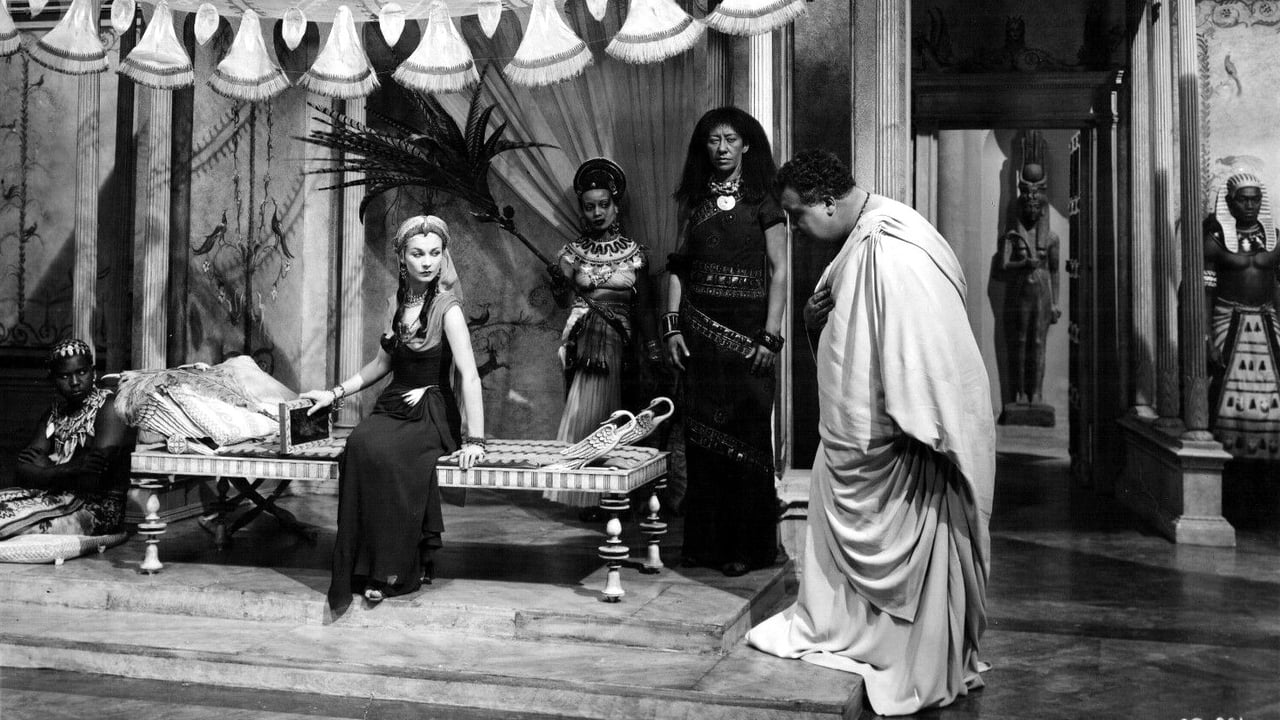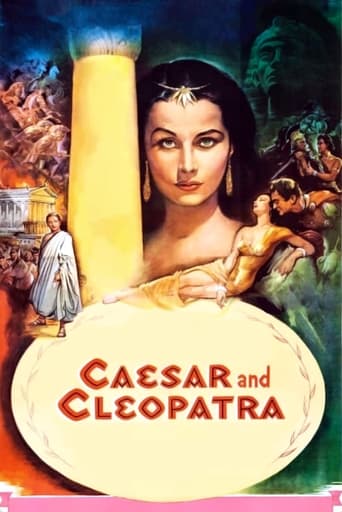

About the only thing that makes this boring trollop of a play bearable at all is the beautiful visage of Vivien Leigh. If this is representative of Bernard Shaw's other works, then I'm thankful for my ignorance of them.
... View MoreAlthough "Caesar and Cleopatra" has this fantastic reputation as the British Cinema's most expensive flop, all this talk about a financial disaster is simply not borne out by the figures. (The Motion Picture Guide even repeats this myth, alleging "a then staggering loss of $3 million"). Allowing an extremely generous estimate of print and distribution costs, the most that would have been lost on first release would be £70,000 — and this would surely have been earned back in the 1948 re-issue alone. In fact, by 1950 the movie was firmly in the black. Since that time, non-theatrical, including TV and video sales have produced windfall profits for the Rank Organisation. But it suited Rank at the time to cry foul. He had no love for Pascal. Or Shaw either. He didn't like being put on the spot when he was forced to bail them out. And it suited him to make "Caesar and Cleopatra" the scapegoat and a cover- up for the enormous losses sustained on movies he did heartily endorse like "Blanche Fury" and "Esther Waters".As for the movie itself, unfortunately Rains is forced to carry it virtually single-handed. Leigh is patently too old for the role — though she looks great in her opening scene. Whoever photographed that was a master of illusion. Alas, the other three cinematographers can't match him. On many later occasions, Miss Leigh is definitely not flattered at all. True, her health declined during production, but no efforts are made to disguise her often ravaged face. Her acting too seems to have fallen away with her beauty.One thing you can say though is that all the money spent on the movie is right up there on the screen, not squandered on inflated star salaries or wasted on half-shot and then abandoned footage. The sets are truly breathtaking, so impressive and expressive as to make the scenery in the Liz Taylor "Cleopatra" seem garish, disorganized and second-rate. Full marks to Bryan and Messel for such dazzling and beguiling triumphs of artistry. A pity neither the script in particular nor the performances in general seem worthy of such visual magnificence.Fortunately, the superb ITV DVD manages the seemingly impossible. On the small screen, everyone comes out with honor – except Vivien Leigh, for whom the color restoration is considerably less than kind, and Flora Robson who not only tends to over-act but seems unsure how to play her role. Is she a comic character or a very sinister one? Shaw, of course, would like to have it both ways, but a subtle actor who has read the script would play the comedy with not just an overdose of asperity but with an intimation of evil. Hard to do, I'll admit, but that's what real acting is all about.Stewart Granger has the right idea. He plays his role tongue-in- cheek. A pity some of his dash and vigor didn't rub off on Claude Rains who is far too solemn for a Shavian hero. Rains is admittedly an adequate Caesar but he lacks the dash he brought to "Casablanca".
... View MoreIt's our amazing good fortune to have this document of one of George Bernard Shaw's greatest plays, filmed during his lifetime so that he could author the screenplay as he wrote the original stage work. It is a monument to the magnificence, not only of Shaw, but of Caesar. It is also a monument to Shaw's brilliant playcraft, clever plotting, and canny application of humor. It goes without saying that Shaw was brilliant, since of course he was a socialist.We have seen this story before, though differently told, when the wonderful Rex Harrison played Caesar to the talented Elizabeth Taylor's Cleopatra. (Both of these names should be written with a K, since that is how they were both actually pronounced.) It is an absolute truth about that later film that only the first half is much worth watching, since Richard Burton in the second half plays a lovesick puppy so well it's thoroughly disgusting. GBS avoids that pitfall by giving us a great Caesar and a delightful Cleopatra, and fabulous stars to play them.Shaw's play tells the story of Caesar's occupation of Alexandria after his final defeat of Pompey, and his defense of his position against perfidious Egyptians and renegade Romans in the service of Ptolemy XIV, Cleopatra's prepubescent brother and husband. The text is a creation of the utmost cunning: nothing less than a successful imitation of Shakespeare (though mostly in a more modern idiom). Few writers other than Shaw would have attempted this feat, and fewer still would have been successful at it.Mentioning Ptolemy XIV, I should mention his (and Cleo's) brother, Ptolemy XIII. They were both married to Cleopatra and each of them was pounding on her bedroom door by the time he was 10. The film, alas, forgets the last Ptolemy, the XVth, called Caesarion, Caesar's son by Cleopatra. It was his official acknowledgement of this son that caused him so much trouble back home.The essence of Shaw is of course his wit. Hardly a play of his is as witty as this one. The film is 2 hours long and seems scarcely an hour, so packed is it with sparkling dialogue.To portray this great literary work, the producers have assembled a gallery of some of the greatest actors of the time. Caesar is played by the hugely talented Claude Rains whose portrayals of iconic roles have made him one of the greatest actors of the last century. He gives the immortal Julius such sangfroid and cool calculation as to make us instantly believe his greatness as a general and statesman.Cleopatra is portrayed by the great Vivien Leigh, who graced and enhanced every part she took. Her beauty is in fact far, far greater than the legendary queen's (we have pictures). There is a rumor that Cleopatra was African (black) by descent which, while not a big deal, is a lie. We know each and every one of her ancestors since before the time of Alexander the Great, and they are all Greek (and mostly closely related). Shaw also cleverly switches the story of the rug from her first meeting with Caesar to ruse to smuggle her into Caesar's emergency redoubt at the Pharos (the Alexandria lighthouse).Apollodoros (misspelt with a "u" before the "s"), the Greek jack of all trades, arts, and talents, is played with huge humor by the inimitable Stewart Granger. Granger's acting talents gave both of the Fairbanks a run for their money. Cleopatra's nurse and chief bottle washer, Ftatateeta, is portrayed by the wonderful Flora Robson. For this part her skin is stained dusky and she's given an Egyptian-style fright wig and is absolutely convincing. When she's on camera, she manages to upstage even the riveting Rains.The roll of talented veteran actors continues. As Pothinos (misspelt with a "us"), Ptolemy's puppet master and master of all nasty diplomatic maneuvers, we have Francis L. Sullivan. It was Pothinos' idea to knock off Pompey in the hope of sucking up to Caesar. No such luck, of course, because Caesar greatly admired and liked Pompey despite the fact that they had recently become enemies. Sullivan portrays Pothinos with delightful wiliness and sliminess. *** As the loyal Rufio, "Caesar's shield", we have a steadfast Basil Sydney. Rufio eventually becomes Roman "governor" of Egypt, although that country was then still technically independent and didn't have a governor. Rufio's part is given a good shot of good-humored testosterone and Sydney gives it great stature. *** The talented veteran Cecil Parker gives us Caesar's faithful British amanuensis, Britannus. His physical stature and Druidic appearance make him very convincing as a 1st-Century BCE British warrior-poet. *** And so on. Every part in this film is well-played by people who know what they're doing.The DVD itself was manufactured in Korea. Don't expect a lot. This Technicolor film has a washed-out look although the colors are usually clear if not vividly bright. The sound is good (but could be better) and as we might expect from actors of stage quality, the dialogue is clear. There are, in addition, English subtitles. There are no extra features, but with older films we seldom get them. Some people might take points off for substandard color and sound. So do I. I give extra stars for Shaw's genius and take them off for an inferior recording of the original film. That leaves the correct total: the maximum.
... View MoreI've noticed that some commentators have derided the historicity of this film--which is completely to miss the point. This is a superb adaptation of a great play by the greatest playwright in the English language after Shakespeare--George Bernard Shaw. (Gabriel Pascal had previously done equally excellent versions of Major Barbara and Pygmalion.) Be forewarned--Shaw's genius was not action, but talk. And what talk this is! As usual, there is an underlying schematic--rational government (Caesar) versus irrational barbarism (Cleopatra). This dialectic informs the entire relationship between the two main characters, set like jewels in a sumptuous physical production and amidst a remarkable set of co-stars--Stewart Granger, Flora Robson, Michael Rennie, and others.Claude Rains' performance is remarkable, full of a combination of wit and a very British sort of weltschmertz. Vivian Leigh is a marvel--this is to my mind without question the best thing she ever did on screen and I include that trying harpy Scarlett O'Hara.Shaw is not very popular right now, in large part I suspect because he forces you to think--not a popular pursuit these days. However, if you want a compelling combination of wit, humor, history, and discourse on government, do not miss this film--or Pascal's other two Shaw films. You may just discover a new favorite writer!
... View More